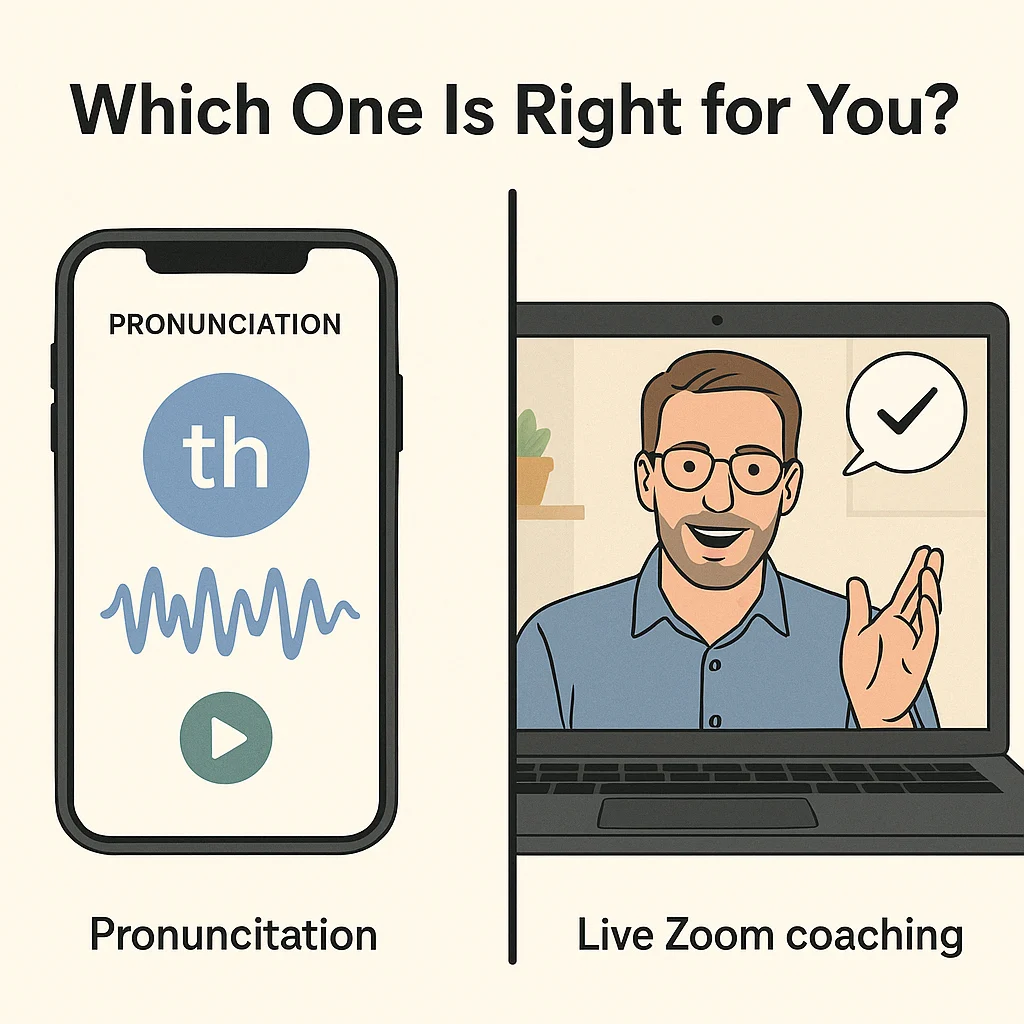How to Lose a Czech Accent and Speak Clear, Natural English

Have you ever felt that moment of frustration when someone asks you to repeat yourself, even though your English grammar is perfect? Or perhaps you’ve noticed subtle shifts in how people respond when you speak, suggesting they’re working extra hard to understand you.
If you’re searching for how to lose Czech accent, you’ve likely experienced these challenges firsthand. The good news is that with the right approach, you can significantly improve your English pronunciation clarity while still maintaining your authentic voice.
Achieving proper pronunciation is crucial, as it can make a significant difference in how well you are understood. Learning a new language comes with its own set of challenges, including reducing one’s native accent, which is essential for effective communication with native speakers.
In this guide, I’ll share practical techniques that have helped thousands of Czech speakers enhance their English communication. Let’s explore effective strategies that actually work.

Introduction to Accent Reduction
Accent reduction is NOT a crucial aspect of language learning, first and foremost. It is an elective coaching / sessions that students go through when they want to take their English speaking skills to the highest level possible for non-native English speakers.
It is completely elective, and it isn’t just about perfecting pronunciation, but also about enhancing understandability and confidence.
Is It Possible to Lose a Czech Accent in English?
Let’s start with the most common question: can you completely eliminate a Czech accent when speaking English?
The honest answer is that while complete elimination is rare and unnecessary, you can significantly reduce your accent to the point where it no longer creates communication barriers. Many of my Czech clients achieve remarkable clarity improvements within 2-3 months of targeted practice.
The goal isn’t to erase your identity or “sound American”, it’s to modify the specific elements that affect how easily others understand you. Think of it as developing more neutral, understandable English that allows your ideas to shine through without pronunciation distractions.
When focusing on how to lose Czech accent, it’s important to understand that we’re aiming for clear, natural-sounding English that lets your personality shine through without communication barriers. Mimicking native speakers’ pronunciation in the same way can help you achieve this goal.

Understanding the Difference in Pronunciation
Czech pronunciation is different from American English in a number of ways. For example, there are specific sounds like the Czech “ř” sound that aren’t present in English. Understanding the correct pronunciation of individual sounds, such as the distinction between short and long vowels, is essential for effective communication.
The Influence of Native Language
The influence of a learner’s native language on their Czech pronunciation cannot be overstated. For example, German accent speakers may find it challenging to pronounce certain Czech sounds due to the differences in mouth muscles and pronunciation habits.
Similarly, speakers of other languages, such as Italian or Russian, may need to adjust their pronunciation to accommodate the unique sounds of the Czech language. Being aware of these differences and practicing regularly can help learners overcome their native language’s influence and develop a more native-like accent.
Why Czech Speakers Struggle with English Pronunciation
Understanding the specific patterns that create a Czech accent in English is the first step toward modifying it effectively. The unique phonetic and grammatical characteristics of Czech, which differentiate it from any other language, play a significant role in this process.
Czech speakers often struggle with English pronunciation due to the distinct differences between Czech and different languages, such as the use of prefixes and the reluctance to borrow from other languages.

Key Differences Between Czech and English Sounds
Czech and English have fundamentally different sound systems:
- Czech has 10 vowel sounds while English has 14+ vowel sounds, including diphthongs
- Czech consonants change voicing at the end of words (final devoicing)
- The Czech “r” is trilled, while the English “r” is formed completely differently
- Czech is a syllable-timed language, while English is stress-timed (some syllables are emphasized while others are reduced)
- Stress in Czech is consistently placed on the first syllable of every word, unlike in English where stress can vary based on the word’s syllable position
These structural differences naturally lead to predictable pronunciation patterns when Czech speakers learn English.

Common Czech-to-English Pronunciation Issues
Several pronunciation patterns tend to mark a Czech accent:
- V/W confusion: “very” often sounds like “wery”
- TH sound challenges: “this” becomes “dis” and “think” becomes “sink”
- Final consonant devoicing: “bad” sounds like “bat” and “bag” sounds like “back”
- Vowel quality issues: English vowel distinctions are simplified to match Czech’s system. In Czech, most words contain vowels, which enables smoother pronunciation and communication, making the absence of vowels in some English words particularly challenging.
- Flat intonation: Czech has less variation in pitch than English, leading to monotone English
- Stress patterns: Emphasis on different syllables than English typically uses
These patterns aren’t mistakes, they’re simply the result of applying familiar Czech speech habits to English. Understanding them gives you specific areas to focus on when working on how to lose Czech accent.

How to Lose Czech Accent: A Step-by-Step Approach
Now that you understand the underlying patterns, let’s look at a practical approach to modifying your accent:
Practice regularly to improve your pronunciation, as consistent practice not only enhances your accent but also boosts your confidence and effectiveness in communication.
Step 1 – Start with Active Listening
Before you can change how you speak, you need to train your ear to hear the differences between your current pronunciation and your target. Many Czech speakers don’t initially detect certain English sound distinctions because they don’t exist in Czech.
Try these listening exercises:
- Listen to English podcasts, audiobooks, or news broadcasts daily
- Pay attention to the rhythm and stress patterns of native speakers
- Notice how words connect in fluent speech
- Focus on the sounds that don’t exist in Czech (like “w” and “th”)
- Notice how words are pronounced differently in English compared to Czech and understand the importance of these differences to improve communication and achieve a more native-sounding accent
Spend at least 15 minutes daily on focused listening to develop your ear for these distinctions.
Step 2 – Shadow Native English
One of the most effective techniques for how to lose Czech accent is shadowing:
- Choose a short audio clip (30-60 seconds) of a native English speaker
- Listen once to understand the content
- Play it again, repeating each phrase immediately after you hear it
- Gradually decrease the gap until you’re speaking almost simultaneously
- Focus on matching not just the words but the rhythm, stress, and intonation
This technique helps you internalize not just individual sounds but also the natural flow and musicality of English speech.
Step 3 – Correct High-Impact Sounds
Focus your practice on the sounds that most strongly mark a Czech accent. Mastering proper pronunciation is crucial for clear communication, as the way words are pronounced can significantly affect understanding and convey different meanings in conversation.
For the TH sounds:
- Place your tongue between your teeth (not behind them)
- For the unvoiced “th” (as in “think”), blow air gently
- For the voiced “th” (as in “this”), add voice while your tongue is between your teeth
- Practice words like “this,” “think,” “brother,” and “three”
For the W/V distinction:
- For “w,” round your lips without touching your teeth
- For “v,” place your bottom lip against your upper teeth
- Practice minimal pairs like “west/vest” and “wine/vine”
For the English R:
- Keep your tongue back in your mouth without touching the roof of your mouth
- No vibration or trill (unlike the Czech “r”)
- Practice words like “red,” “around,” and “very”
For final voiced consonants:
- Make sure to maintain voicing through the final sound in words like “bad,” “dig,” and “bag”
- Exaggerate the length of the final sound initially
- Feel the vibration in your throat to ensure you’re voicing the sound
Step 4 – Record and Analyze
Regular recording is crucial for objective feedback:
- Choose a paragraph to read or a topic to speak about for 1-2 minutes
- Record yourself speaking
- Listen critically, noting specific sounds or patterns that sound different from native speakers
- Practice the challenging elements
- Record again and compare to track your progress
This cycle of practice, feedback, and adjustment creates rapid improvement. Additionally, focusing on achieving a smooth flow in your speech can significantly enhance your communication skills, often outweighing the need for accent perfection.
Working with an Accent Coach
Working with an accent coach can be incredibly beneficial for learners seeking to improve their accent and pronunciation. A native English speaker can provide personalized guidance, correct pronunciation errors, and offer feedback on individual sounds and speech patterns.
Furthermore, an accent coach can help learners develop a more nuanced pronunciation.

Czech Accent Examples: Before and After Corrections
Here are some typical pronunciation patterns that signal a Czech accent, along with their clearer alternatives:
Czech accent: “I sink zis is a wery nice place.” Clearer English: “I think this is a very nice place.”
Czech accent: “She hat a goot time at ze party.” Clearer English: “She had a good time at the party.”
Czech accent: “Ze trafic was really pat today.” Clearer English: “The traffic was really bad today.”
Czech accent: “I vill call you ven I get home.” Clearer English: “I will call you when I get home.”
By focusing on these specific patterns, you’ll make rapid progress in how quickly you can see improvements in your speech when speaking English.
How Long Does It Take to Lose a Czech Accent?
The timeline for reducing a Czech accent depends on several factors, but here’s what most of my clients experience:
- First noticeable improvements: 2-4 weeks of consistent practice
- Significant reduction in communication barriers: 2-3 months
- Comfortable, natural-sounding speech: 4-6 months
- Automatic clearer pronunciation in various situations: 6-12 months
Many words in Czech can lack vowels, leading to complex consonant clusters that can hinder fluency. Consistent practice and regular exposure to English are crucial for overcoming these challenges and achieving a natural-sounding accent.
Factors that influence your timeline include:
- How many sounds and patterns need modification
- Your daily practice consistency (this is the most important factor)
- The quality of your feedback and guidance
- Your regular exposure to English
- Your age (though adults of all ages can make significant improvements)
Remember that consistency is more important than intensity. Fifteen to thirty minutes of daily practice will yield better results than occasional longer sessions.
Should You Use an App or a Coach for Accent Reduction?
The short answer is – it depends. But you’ll need to decide whether to use self-study resources, online resources, or work with a professional coach.
What Apps Can Do
Several self-study resources can help you make progress:
- Pronunciation apps like ELSA Speak or Speechling
- YouTube channels dedicated to English pronunciation
- Speech analysis tools that visualize your intonation
- Structured practice materials and exercises
These tools work well for:
- Building awareness of pronunciation differences
- Regular practice of specific sounds
- Tracking general progress over time
- Convenience and affordability
- Learning new words through immersive experiences like watching English media, which helps with vocabulary acquisition and accent development
What Apps Can’t Do
Despite their benefits, apps have significant limitations:
- They can’t identify your specific Czech-influenced patterns
- They’re limited in detecting subtle rhythm and stress issues
- They provide generic feedback rather than personalized correction
- They can’t adapt to your specific learning style or challenges
- They often fail to address the nuances of different sounds, which is crucial for understanding the subtle differences in pronunciation and vowel usage that distinguish languages like Czech and Slovak
When to Work with a Coach
Working with an accent coach offers several distinct advantages:
- Professional assessment of your specific speech patterns
- Real-time feedback and correction before incorrect habits form
- Customized exercises targeting your unique challenges
- Accountability and structured progression
- Strategies for applying new patterns to real-world situations
- Achieving pronunciation skills that resemble those of a native speaker, ensuring effective communication and improving your accent with practice techniques and resources like voice recordings from native speakers
Consider working with a coach if:
- You’ve tried self-study but keep making the same mistakes
- You can’t hear certain sound distinctions
- You want to accelerate your progress
- You need accountability to maintain consistent practice
- You’re preparing for important presentations or interviews
The most effective approach often combines initial coaching to establish correct patterns with app-based practice between sessions. This gives you both the professional guidance and the consistent reinforcement needed for lasting change.

How to Lose Your Czech Accent Without Losing Your Personality
Many Czech speakers worry that modifying their accent somehow means rejecting their cultural identity. This concern is both common and understandable. Understanding the unique characteristics of the Czech language, such as the challenging sound of the letter ‘ř’, is crucial for connecting with native speakers and appreciating Czech culture.
The truth is that accent modification is about adding communication options, not subtracting from your identity. Think of it like code-switching between languages – you’re developing the ability to speak in different ways for different contexts while remaining authentically yourself.
Many successful Czech professionals maintain their accent in personal settings while shifting to clearer pronunciation in professional contexts. This flexibility is a valuable skill, not a rejection of heritage.
Remember that your unique perspectives, expressions, sense of humor, and personality are what make you who you are – not your pronunciation patterns. Improving your clarity doesn’t mean becoming someone else; it means allowing your true self to be better understood.
Success Stories: Czechs Who Transformed Their English
Let me share a few examples of how Czech speakers have successfully modified their accents:
Pavel, Tech Professional: Pavel struggled during international team calls, often having to repeat himself multiple times. After two months of focused work on the “th” sounds and final consonants, he transformed his communication. “The biggest change,” he says, “is that I no longer see that confused look on people’s faces. My expertise is finally being recognized because people can focus on my ideas rather than struggling to understand my words.”
Markéta, Academic Researcher: Markéta was hesitant to present her research at international conferences despite her excellent academic work. By focusing on intonation patterns and the w/v distinction, she developed a clearer speaking style. “Now I can share my research confidently,” she reports. “Colleagues ask insightful questions about my content instead of asking me to repeat myself.”
Jan, Business Professional: Jan worried that his accent was limiting his career advancement opportunities. After working on his pronunciation for three months, he successfully navigated a series of interviews for a promotion. “My communication skills were specifically mentioned as a strength in my performance review,” he shares. “This wouldn’t have happened before I improved my pronunciation.”
These success stories demonstrate how focused practice on how to lose Czech accent can create meaningful improvements in a relatively short time.

Advanced Tips to Speed Up Progress
Here are some additional strategies to accelerate your accent modification:
Practice regularly to improve your pronunciation. Consistent practice not only enhances your pronunciation but also fosters greater confidence and effectiveness in communication, ultimately contributing to overall language proficiency.
Practice Real-Life Conversations
Develop realistic scripts for situations where clear communication is particularly important:
- Job interviews and professional introductions
- Technical explanations relevant to your field
- Phone calls and video conferences
- Common social interactions
- Understanding the nuances of different prepositions in English, as they can significantly affect the meaning and interpretation of phrases
Practice these scripts until they feel natural, focusing on the specific sounds and patterns you’ve been working on.
Try Minimal Pairs and Tongue Twisters
Minimal pairs (words that differ by just one sound) are excellent for targeted practice:
- “thin” vs. “sin”
- “west” vs. “vest”
- “bad” vs. “bat”
- “bag” vs. “back”
Tongue twisters help build muscle memory for challenging sounds:
- “Three thin thinkers thought thoroughly” (for the “th” sounds)
- “Red lorry, yellow lorry” (for the English “r” and “l”)
- “We will wait while you work” (for the “w” vs. “v” distinction)
Practice these daily for just 5-10 minutes to see significant improvement.
Use Tools Like Speech-to-Text Apps
Speech recognition technology can provide immediate feedback:
- Use a speech-to-text app (like Google’s voice typing)
- Speak a sentence or paragraph
- Check if the app transcribes your words correctly
- If it misunderstands certain words, focus on those pronunciation patterns
Conclusion: Ready to Lose Your Czech Accent and Speak With Confidence?
Now that you understand the process, here are the first steps you can take to begin reducing your Czech accent:
- Start with awareness: Record yourself speaking English naturally, then listen critically to identify patterns
- Train your ear: Spend 15 minutes daily listening to native English speakers, focusing on the elements that differ from your speech
- Learn correct mouth positions: Practice the specific tongue and lip positions for challenging sounds like “th,” “w,” and the English “r”
- Focus on rhythm and stress: Practice emphasizing the correct syllables in words and using appropriate intonation in sentences
- Get proper guidance: Consider a professional assessment to identify your specific challenges and create a targeted plan
Remember that accent modification is a skill development process, not an overnight transformation. With consistent practice and the right guidance, you can dramatically improve your English pronunciation clarity while maintaining your authentic voice.
If you’re ready to take the next step in reducing your accent, I offer free accent assessments to identify exactly which aspects of your speech would benefit most from modification and create a customized plan for your specific needs.
Schedule Your Free Accent Assessment Today!

Frequently Asked Questions
Can I lose my Czech accent completely?
While complete accent elimination is rare, you can certainly reduce it to the point where it no longer creates communication barriers. Most Czech speakers can develop pronunciation that is easily understood by native English speakers with a few months of focused practice. Rather than aiming for “no accent,” focus on clear communication as your goal.
Is it better to learn American or British pronunciation?
Choose the variety you’ll use most often in your daily life or professional context. If you work primarily with Americans or plan to live in the US, focus on American pronunciation. If you interact mostly with British English speakers, prioritize those patterns. The key is consistency – mixing the two can create confusion.
What’s the most difficult sound for Czechs in English?
While individual challenges vary, most Czech speakers struggle most with the “th” sounds (both voiced as in “this” and unvoiced as in “think”), the distinction between “w” and “v,” and maintaining voiced consonants at the ends of words. The rhythm and stress patterns of English also present significant challenges since they differ fundamentally from Czech.
Will this help with job interviews or presentations?
Absolutely. Clear pronunciation is particularly valuable in high-stakes communication scenarios like job interviews, presentations, and important meetings. When people can understand you effortlessly, they can focus entirely on your qualifications, ideas, and expertise rather than working to decipher your speech. Many clients report that improved pronunciation has directly contributed to professional advancement opportunities.

